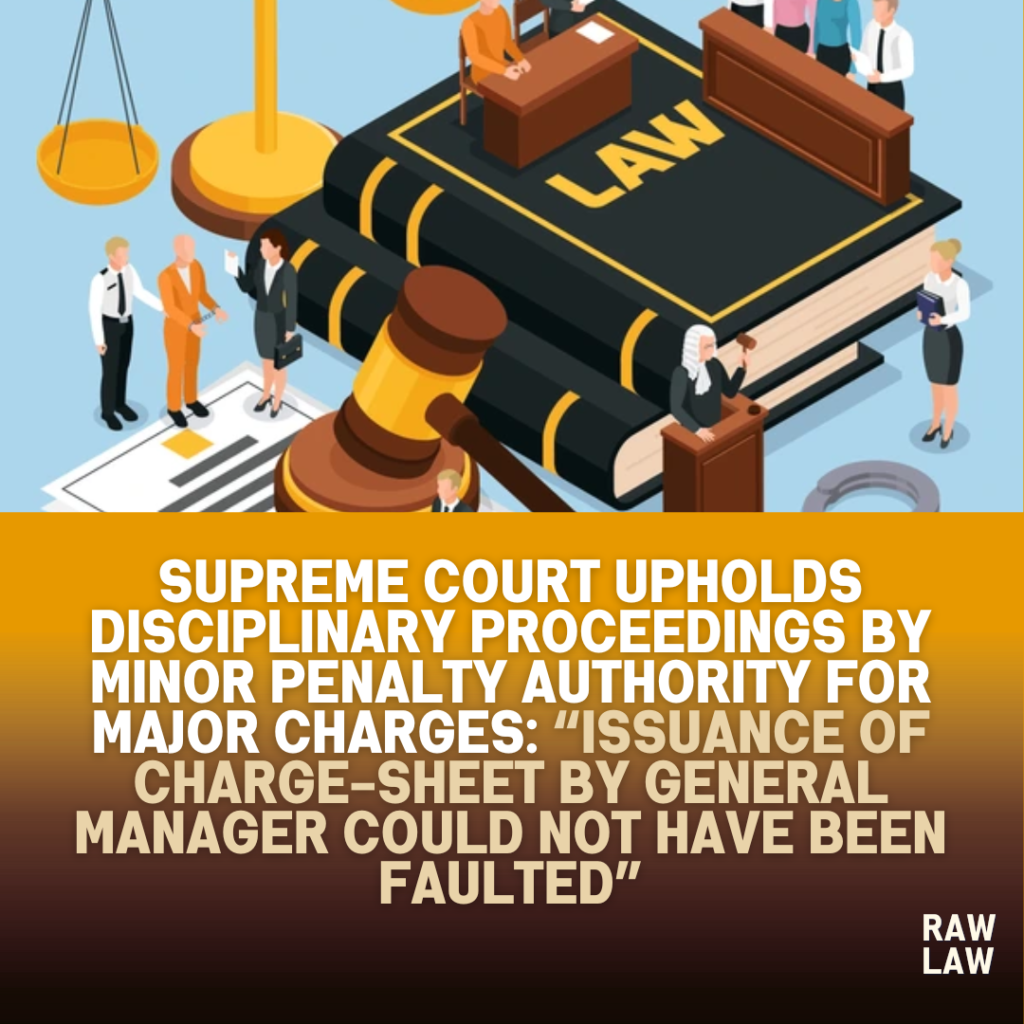Court’s Decision
The Supreme Court set aside the Karnataka High Court’s order that had quashed disciplinary proceedings against a former telecom official on the ground that the charge-sheet was issued by an authority competent only to impose minor penalties. The Court ruled that the General Manager was empowered to initiate disciplinary proceedings under Rule 13(2) of the Central Civil Services (Classification, Control and Appeal) Rules, 1965, even for major penalties, and held that the High Court’s reliance on the precedent of Union of India v. B.V. Gopinath was misplaced. The appeal was allowed and the proceedings initiated under the two charge memos were held to be valid.
Facts
The respondent, a Sub Divisional Engineer in the Department of Telecommunications, retired in 2018. He had been convicted in two criminal cases—one for accepting a bribe under Sections 7 and 13(2) read with Section 13(1)(d) of the Prevention of Corruption Act, and another for possessing disproportionate assets under Section 13(1)(e) read with Section 13(2) of the same Act. Appeals against these convictions were filed and are still pending, with both conviction and sentence stayed.
Simultaneously, two disciplinary charge-sheets were issued under Rule 14 of the CCS (CCA) Rules in 2006 and 2008. The respondent challenged these through multiple proceedings before the Central Administrative Tribunal (CAT), alleging procedural infirmities and lack of authority in issuing the charge-sheets.
Issues
- Whether a charge-sheet for major penalties can be validly issued by an officer who is empowered only to impose minor penalties under the CCS (CCA) Rules?
- Whether the reliance by the High Court on Union of India v. B.V. Gopinath to invalidate the disciplinary proceedings was justified?
Petitioner’s Arguments
The Union of India contended that the General Manager, though empowered to impose minor penalties, could still issue charge-sheets for major penalties under Rule 13(2) of the CCS (CCA) Rules. It was argued that the High Court wrongly applied the ratio in B.V. Gopinath, which dealt with different factual and legal circumstances.
Respondent’s Arguments
The respondent submitted that the disciplinary proceedings were void ab initio as the charge-sheets were issued by an officer not competent to impose major penalties. He relied heavily on the Supreme Court’s judgment in B.V. Gopinath, arguing that any charge-sheet under Rule 14 should be issued only with prior approval from an authority competent to impose major penalties.
Analysis of the Law
The Supreme Court analysed Rule 13(2) of the CCS (CCA) Rules, which expressly allows a disciplinary authority competent to impose minor penalties to initiate proceedings for major penalties. Rule 14 prescribes the procedure for imposing such major penalties.
Further, Appendix 3 to the CCS (CCA) Rules was examined, which clarified that while the Member of the Telecommunications Commission is the appointing authority and competent to impose major penalties, other officers like the General Manager may still initiate proceedings.
Precedent Analysis
The Court distinguished Union of India v. B.V. Gopinath [(2014) 1 SCC 351], noting that the said case concerned an Indian Revenue Service officer and involved an office order that mandated prior approval of the Finance Minister before initiating disciplinary proceedings. No such requirement was shown to exist in the present case involving the Department of Telecommunications.
Thus, the principle from B.V. Gopinath was held to be inapplicable due to the absence of a similar approval requirement under the applicable statutory rules.
Court’s Reasoning
The Court observed that the General Manager, though empowered only to impose minor penalties, was still statutorily authorised under Rule 13(2) to initiate disciplinary proceedings for major penalties. The final order, in any case, would have to be passed by an authority competent to impose such penalties.
The Court held that the entire disciplinary process was conducted in accordance with the CCS (CCA) Rules, without any procedural infirmity, and thus did not warrant interference.
“Issuance of charge-sheet by General Manager, Telecommunication could not have been faulted upon by the High Court solely by placing reliance upon the judgment delivered by this Court in the case of B.V. Gopinath.”
Conclusion
The appeal was allowed. The Supreme Court upheld the validity of the charge-sheets issued under Rule 14 by the General Manager and set aside the Karnataka High Court’s judgment. The disciplinary proceedings were deemed lawfully initiated and conducted.
Implications
This judgment settles the position that a disciplinary authority competent to impose minor penalties can validly initiate proceedings for major penalties under the CCS (CCA) Rules. The decision reinforces the legal framework under Rule 13(2) and distinguishes situations where internal government office orders may necessitate additional approvals.
It also clarifies the limited applicability of the precedent in B.V. Gopinath, preventing its overuse in contexts where no such administrative approval is required.
Judgments Cited
- Union of India & Ors. v. B.V. Gopinath [(2014) 1 SCC 351]: This case involved an IRS officer and required prior approval from the Finance Minister under a specific office order. The Court clarified that the decision was fact-specific and did not apply in the absence of such administrative instructions.
FAQs
Q1. Can an officer empowered to impose only minor penalties issue charge-sheets for major penalties under the CCS (CCA) Rules?
Yes. Rule 13(2) of the CCS (CCA) Rules expressly permits such initiation of proceedings. Final penalty orders, however, must be issued by the competent authority.
Q2. Does the Supreme Court’s decision in B.V. Gopinath apply to all departmental inquiries?
No. The Court clarified that B.V. Gopinath is fact-specific and applies only where there is an explicit requirement of higher authority approval, such as through an office order, which was absent in the present case.
Q3. What is the significance of this judgment for future disciplinary actions in government services?
It affirms that initiation of disciplinary proceedings does not get vitiated merely because the initiating authority is empowered to impose only minor penalties, provided the rules permit such initiation.



